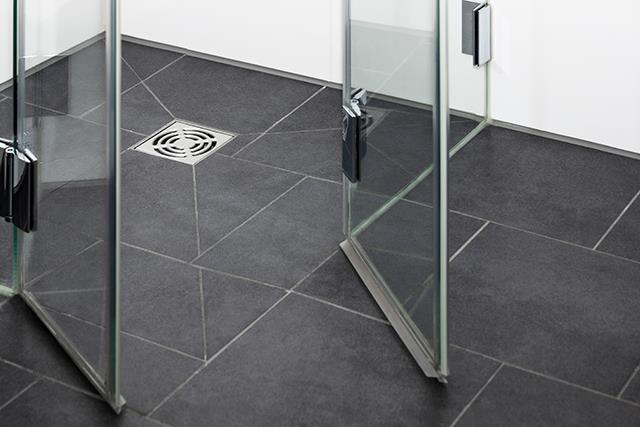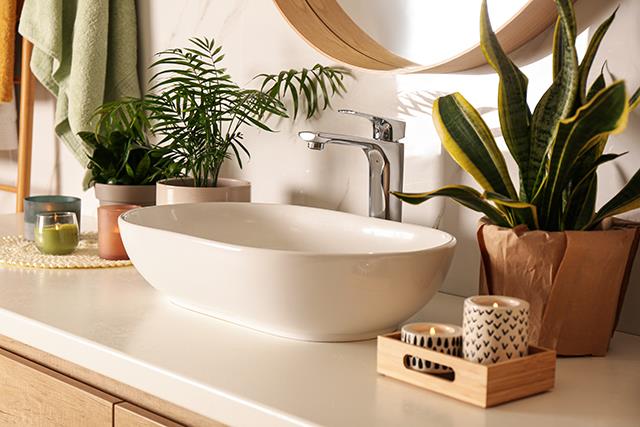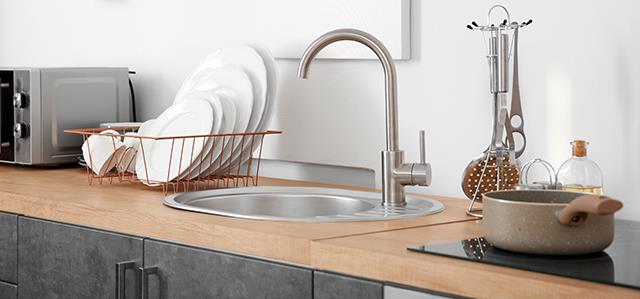If you have a smelly drain in a bathroom or kitchen it could be an early sign that immediate action be taken to clean out the drain to prevent future blockage and also get rid of the smell at the same time.

READ: Cleaning Tips: How to deep clean a bathroom
Smelly drains are not something you want in your home and it is also an indication that there is a hidden problem in at least one area of the house. But before you rush to call in a plumber and incur expensive call-out costs, Home-Dzine shares a few quick and easy solutions for smelly drains that you might want to try first.
Smelly shower drain

A smell emanating from a bathroom shower drain is usually picked up fairly quickly and the offensive smell can be dealt with in a short amount of time.
You do not need to be a plumber to fix a smelly drain and any home DIYer can attend to the problem. If, after attempting to sort out the problem you realise that nothing has changed, then it is time to call out a plumber.
- Remove the cap from the drain. This could be a screw-on or push-on lid so be sure to have assorted screwdrivers on hand to make the task easier.
- Use a drain auger or drain snake or make your own using a steel coat hanger straightened out with a small hooked shape on the end. Insert this into the drain as far as you can and then twist it around to try and hook into whatever may be causing the blockage. Pull out and repeat this until you cannot feel any further blockage in the drain pipe.
- Flush with clean water to remove any remaining debris in the drain pipe.
Smelly Bathroom Basin Drain

Bathroom drains are different from shower drains in that they have a waste trap fitting underneath the sink. In South Africa, this waste trap is more commonly known as a P-trap or U-trap depending on its shape. These waste traps are specifically designed to allow the flow of water down the drain but also keep behind a level of water that prevents bad smells from coming up the drain from the sewer system. When the waste traps become blocked and no longer filled with water, this allows the smell into the room and it is why you need to clean this out.
Another factor to take into consideration and one that can affect the health of a family is that of bacteria build-up. Bacteria such as biofilm can form in bathroom drains and are caused by a collection of bacteria that stick to the inside of pipes. Bathroom drains be given a regular cleaning to prevent this.
Flush Bathroom Basin Drains
- Regularly clean drains with white spirit vinegar and bicarbonate of soda. I like to keep my used facial wipes for when cleaning drains. Cover the drain hole with a single layer of a wipe, add a tablespoon of bicarbonate of soda and pour a cup of vinegar over the top. Flush clean water down the drain.
- This method not only assists in preventing biofilm and other bacterial build-up but also helps to keep the drain clean when done regularly.
Safety first: Do wear disposable or rubber gloves when dealing with waste traps.
- Regardless of the type of waste trap you have under the sink, this can be unfastened using a plumber's wrench. Make sure that the basin holds no water, or have a bucket handy to catch wastewater and then loosen the fittings holding the waste trap in place.
- Remove the trap and take outdoors to flush with a hosepipe or under an outside tap until clean. Use a rag - one that can be thrown away afterwards - to wipe the pipe clean.
- Replace the waste trap and flush the drain with white spirit vinegar and bicarbonate of soda.
Smelly kitchen sink drain

Kitchen sinks have to deal with a lot of household waste and fluids and are prone to blockage if oils or food waste enter the drain. Oils and fats cool and congeal when they hit the water in the waste trap and if food waste is disposed of down the drain, this sticks together to create a mass that eventually builds up and blocks the drain.
Good to know
A regular flush with white spirit vinegar and bicarbonate of soda will prevent oil and fat-based blockages, keep pipes clean and prevent any build-up of bacteria or harmful micro-organisms. Regardless of the type of waste trap you have under the sink, this can be unfastened using a plumber's wrench. Make sure that the basin holds no water, or have a bucket handy to catch wastewater and then loosen the fittings holding the waste trap in place.
- Remove the trap and take outdoors to flush with a hosepipe or under an outside tap until clean. Use a rag - one that can be thrown away afterwards - to wipe the pipe clean.
- Replace the waste trap and flush the drain with white spirit vinegar and bicarbonate of soda.
If any of the above does not solve the problem, you should consult with a reputable plumber or blocked drain contractor to fix any problem further along the drainage system although, even if this is the case, there are a few things that a DIY homeowner can do themselves.
READ: The top 10 scents that will sell your home faster
Clean up smelly areas
A funky smell in a home will be one of the first to hit your senses as you walk into it. Ideally, a home should smell like nothing - a fresh feeling that signals that you’re walking into a clean space, says Aisha Pandor, co-founder of SweepSouth.
“Dirty areas harbour odours, and while that may seem obvious, the longer you live with bad smells, the less you notice them. Walk around your home to identify if there are any areas that need to be refreshed. Carpets, curtains, fabric couches, and even cushions trap household smells like cooking and cigarette smoke, and unwashed bedding and towels, and dirty showers are sources of unappealing odours,” she says.
Other obvious funky-smell traps are rubbish bins, diaper buckets, and pet litter trays that aren’t cleaned out every day. Layering fragrances over these smelly areas won’t help - the most effective approach is to regularly clean them. “There’s no substitute for a deep cleanse to banish odour offenders - it’s the fastest way to deal with bad smells,” says Aisha. “If you don’t like strong scents, opt for cleaning products that aren’t too heavily scented, and open windows wide to make your space feel cleaner.”
READ: Scents to make your home ‘unforgettable’
Bicarb magic
There are many great cleaning products on the market, but simple, affordable bicarbonate of soda is the unsung hero of the odour-neutralising world. When applied to messes around the house, this powdery substance acts as an smell-absorber and a mild abrasive that can quickly loosen stuck-on gunk without damaging the surface. Pair it with other household cleaners, such as dishwashing liquid, and it becomes an even more powerful cleaning agent, allowing you to break through greasy residue, polish metal, unclog drains, and more.
“Sprinkle bicarbonate of soda on carpets and couches and leave for an hour to absorb smells, then vacuum up the residue,” advises Aisha. “You can also eliminate stubborn kitchen odours by sprinkling it between layers of trash as the bin fills up. If your fridge has been cleaned but still has a lingering musty smell, place a small bowl filled with bicarb inside on a shelf to absorb the odour. You can even add half a cup of bicarb to a load of laundry to act as a deodoriser,” she says.
Want all the latest property news and curated hot property listings sent directly to your inbox? Register for Property24’s Hot Properties, Lifestyle and Weekly Property Trends newsletters or follow us on Twitter, Instagram or Facebook.








